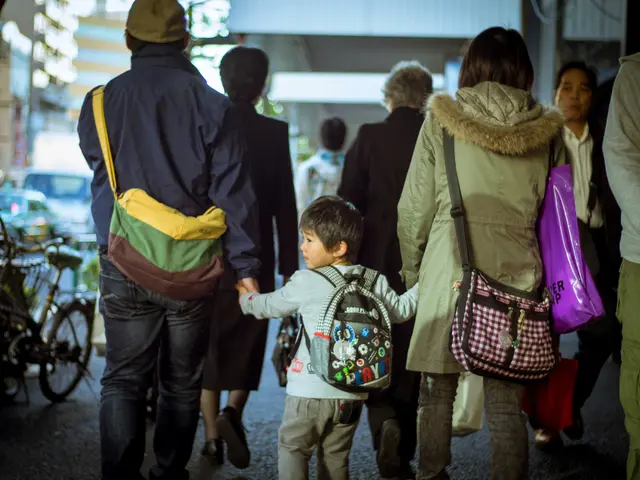Paris Summit: Macron Advocates for Syria's Minorities Protection and EU Sanction Changes
- *
Gathering in Paris: Macron urges al-Shaar to safeguard Syrian minority groups - Gathering in Paris: Macron Urges al-Sharara to Safeguard Syria's Minorities
Emmanuel Macron voiced his concerns regarding the gruesome attacks against religious minorities in Syria by al-Shaara, raising eyebrows among Syria's friends. Macron emphasized the need for legal prosecution of the offenders and EU sanctions against those responsible.
Al-Shaara assures that safeguarding all Syrians remains his government's top priority and iterates his call for the lifting of sanctions against his nation. Critics contend that these sanctions no longer target the ruling regime but instead inadvertently affect the innocent populace. The Syrian head also made his first visit to Paris as a head of state following the conflict.
The French president linked a potential lifting of EU sanctions to Syria's political stabilization. If Syria achieves this, there may be a phased withdrawal of EU sanctions. Macron also urges the USA to eliminate sanctions against Syria under certain conditions and continues supporting the US military's fight against ISIS militias in Syria.
While Syria's leadership claims to protect minorities within the country, reports of massive civilian killings in primary Alawite regions surfaced in March. Last week's clashes between government troops and the Druze minority drew widespread international condemnation, with numerous Druze casualties.
Some criticize Macron's invitation to al-Shaara, citing his past affiliation with jihadist groups. Jean-Noël Barrot, the French Foreign Minister, considers engaging with the Syrian interim government as an essential step, citing terrorist eradication, migration control, drug trafficking, and the future of Lebanon as central Syrian issues.
Minority representatives from Syria protested in Paris against al-Shaara's visit, chanting, "Go away, Dscholani!" A reference to his previous nom de guerre. Before meeting Macron, al-Shaara met with the defector known as Caesar, who left Syria in 2013 with tens of thousands of photos depicting torture victims. Al-Madhan later testified before the US Congress, leading to the enactment of the Caesar Act and the imposition of sanctions on the Syrian leader Bashar al-Assad and other supporters.
In Germany, Netherlands, and France, Caesar photos were instrumental in securing convictions for murder and torture by the Syrian state. After revealing his true name in a February interview with Al-Jazeera, Al-Madhan lived under a false identity.
- Emmanuel Macron
- Paris
- Syria
- EU
- Bashar al-Assad
- USA
- Jihadists
- Alawites
- Crimes
- Syria's friends
- Druze
- US Army
- International context
- Sanctions easing
- Caesar Act
Syria Sanctions
Conscious of Syria's instability, the EU has implemented a comprehensive sanctions regime targeting individuals and entities accused of violating human rights since the conflict commenced in 2011. Punitive measures include:- Individual and entity asset freezes and travel bans- Economic restrictions on specific goods and services- Sectoral curbs, such as those impacting oil and financial services[5]
The EU amended its Syria sanctions regime in February 2025, although specific aspects of the modification are not detailed in the accessible information[3].
Lifting Sanctions Proposals
There is a gradual shift in opinions regarding the future EU sanctions on Syria, with Emmanuel Macron advocating for a phased withdrawal of sanctions. However, no specific timeline or conditions for such withdrawal have been announced[1]. The EU has yet to release a comprehensive plan for sanction lifting, but there is a growing consensus to review and potentially end the sanctions regime as a component of broader post-conflict reconstruction and transition efforts[5].
Decisions concerning sanctions are typically determined through EU Council deliberations, and any changes must be approved by member states.
International Stance
The international stance on sanctions is multifaceted, with various countries adopting contrasting positions. Recently, the UK removed some sanctions, aiming to boost Syria's economic recovery[3][4]. In contrast, the EU's positions remain unyielding, with ongoing calls for the observance of Syria's sovereignty and respect for humanitarian law due to escalating violence[2].
- The Paris Summit, attended by Emmanuel Macron, focused on the protection of minority groups in Syria and the potential easing of EU sanctions against Syria.
- Macron advocated for a phased withdrawal of EU sanctions in exchange for Syria's political stabilization, trying to coordinate this with a potential US withdrawal of economic sanctions under certain conditions.
- Al-Shaara, the Syrian head of state, met with Emmanuel Macron in Paris, despite critics questioning his past affiliation with jihadist groups.
- Reports from Alawite regions in Syria showed massive civilian killings, and the international community condemned clashes between government troops and the Druze minority.
- Germany, Netherlands, and France have secured convictions for crimes committed by the Syrian state using photos leaked by a defector known as Caesar, after he testified before the US Congress, leading to the Caesar Act and the imposition of sanctions against Bashar al-Assad.








